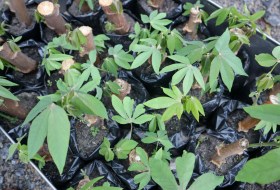News
Unicauca researchers boost cassava production in northern Cauca
Investigation - Monday, February 6, 2023
Unicauca researchers boost cassava production in northern Cauca
The Biotransference project, led by the Cytbia and Anthropos research groups, delivered seeds and mother seedlings of different varieties in Santander de Quilichao. It seeks to promote quality practices in cassava production processes for different purposes in the market.
With the aim of supporting and promoting cassava producers in the Department of Cauca, the Biotransferencia research project, currently being carried out by the University of Cauca, delivered seeds and mother seedlings of different varieties to the Zanjón de Garrapatero Community Council and the community of the village of San Francisco in Santander de Quilichao, in northern Cauca.
"We are being benefited with some seeds that have had a varietal cleaning to renew sowing. The University is contributing to the development of this part of the department, giving us these staked seeds and also seedlings for us to start making our seed bank that will benefit all the communities that live from this cassava culture”, indicated Alejandro Medina, representative of the Association of Graters and Growers of Yuca del Cauca.
The delivery of seedlings is one of the main activities of the project, since through the study the problems that the department has in terms of availability of quality seed are known. "We want to provide producers with seeds that allow them to increase their productivity, their yield, but above all that they can produce a product that meets the standards or market requirements," said Diana Niño, a member of the Research Group.
The sprouts that were delivered are plants from CIAT that, with the support of the Clayuca Corporation, made it possible to access said material. These varieties are resistant to diseases such as toad skin. "When they arrived at the University of Cauca, they were planted on the La Rejoya farm, after four to five months, the seed multiplication process began through the cutting of axillary buds and mini stakes, after 45 days and finishing their process. hardening, they were ready to be taken to the field, today we can deliver them to cassava producers in different municipalities, this time we started with Santander de Quilichao”.


